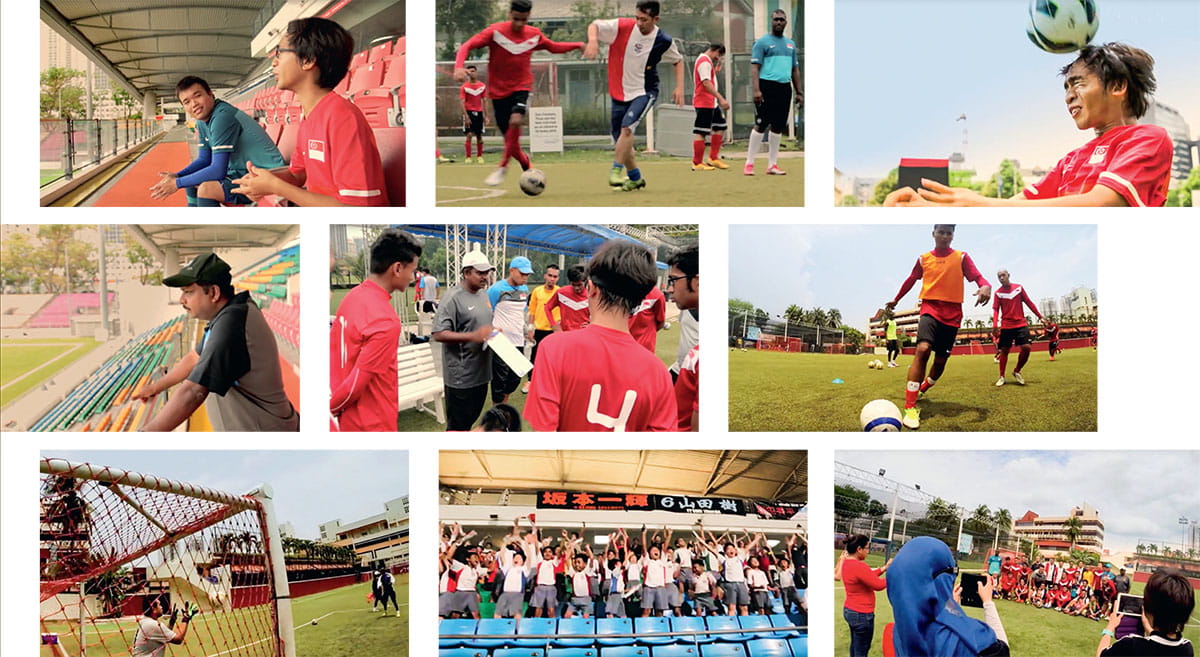Stories > Champions on the Pitch
Champions on the Pitch
BY SASHA GONZALES

Physical limitations are no match for the Singapore cerebral palsy football team, who went all out for gold at the ASEAN Para Games 2017 in September.
n September, cerebral palsy football teams from 11 Asian nations battled it out at the ASEAN Para Games (APG). The Singapore team, comprising 14 players, were led by coach Mohamed Zainudeen Hassan (Coach Zai). Previously, they won silver in the 2013 APG and bronze in the 2015 APG. And in the last six months, they’d been training hard, hoping to show Singapore what else they’re capable of.
Cerebral palsy is related to a brain injury or to problems with brain development, and affects a person’s ability to move. Symptoms range from poor muscle coordination and stiffness, to tremors or involuntary movements, variations in muscle tone, difficulty with precise motions, and seizures. Coach Zai says that when the Singapore Disability Sports Council (SDSC) offered him the coaching position in 2010, it seemed an impossible task. But he accepted it and wasted no time recruiting players and training them.
The SDSC certainly made the right choice. Coach Zai has been coaching football teams for 25 years. On top of being a certified disability football coach, he holds an Asian Football Confederation “A” licence, which means he’s qualified to coach the sport at the highest level. Over the last seven years, he has learnt to be extra patient with the team, while uncovering individual weaknesses and strengths. He says that the job has been fulfilling. “Even though they all have cerebral palsy, their disability classifications are different. A C5 classification indicates severe disabilities; C8 describes someone whose condition is not that bad. The C6 and C7 groups have some limitations. I’ve had to tailor the training to suit each member and learn how and when to push each player.” The players vary in age, too – the youngest is just 17 and the oldest, 37.
PLAYING WITH NO LIMITS
Defender Suhaimi Sudar, who has had cerebral palsy since birth, doesn’t feel it has held him back. Four years after joining the team, he is, in Coach Zai’s opinion, one of their most important members.
“Football has always been my passion, so I didn’t think twice about joining,” says the bespectacled 27-year-old. “It hasn’t always been easy, but the biggest issue I’ve had to deal with so far is time management. I work as an import executive, so I’ve had to learn to organise my time to accommodate training – we train three or four times a week.” Like Sudar, midfielder Shafiq Ariff, 24, says being on the team has been a positive experience.
“There’ve been plenty of highs and lows since I joined four years ago, but training with my teammates has made me stronger and more confident,” he says. “I don’t really think about my disability during a game. I used to take criticism to heart but, because I’m now part of a team, I’ve had to look at the bigger picture. Criticism is given to help me improve. The better I play, the more likely I am to make Singapore proud.”
The team have shown that while they have physical limitations, having cerebral palsy doesn’t mean they cannot play a sport competitively. In fact, they have beaten able-bodied players in friendly matches many times. Coach Zai says: “When a match is over, their reaction is usually one of surprise. They usually say, ‘Wow, that was a tough match, they gave us a good fight.’”
Coach Zai believes playing on the international stage has done wonders for the team’s confidence and self-esteem. “They loved the news and social media coverage they got after the last two APGs. And they felt good knowing that people were watching them play and cheering them on. They have a lot of public support and that inspires them to do their best on the pitch.”
It has also facilitated bonding with international counterparts. The team are especially close to the Iranian and Malaysian cerebral palsy football players and are in frequent contact with them.
“ Training with my teammates has made me stronger and more confident. I donʼt really think about my disability during a game. ”
Shafiq Ariff, midfielder, Singapore cerebral palsy football team
Sunny Shalesh, who coaches the Malaysian team, says that the Singapore team owe their success to the talent and dedication of the players and the leadership of “master tactician” Coach Zai. “Our relationship with the Singapore team goes back to 2011, when Malaysia’s Pan-Disability Football Club organised the Malaysia-Singapore Disability Football Championship. The Singapore team were representing SDSC. We didn’t think the guys were anything more than recreational players... But they emerged champions of the 2011 series,” he says.
The team have been featured twice on Our Better World, the Singapore International Foundation’s digital storytelling initiative, and this coverage has attracted new players, generated interest from other football coaches who were keen to volunteer their services, and brought in sponsors for sports apparel and equipment. At press time, the team were focused on APG 2017. “We want to raise the profile of the sport and attract new players. For that to happen, we need to keep doing well,” says Coach Zai. “Even if we don’t bring home gold, we hope that the public, the media, and our corporate sponsors will continue supporting us. That will help us to keep at the sport and build a bigger and better team for future competitions.”
